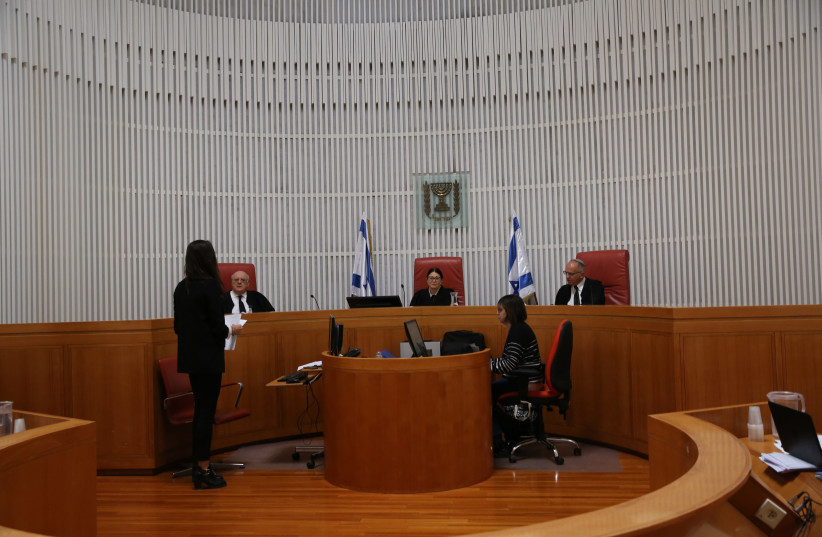The High Court of Justice on Tuesday held a hearing about whether to extend the detention of World Vision case defendant Mohammad El Halabi beyond the five-and-a-half year point.
The state prosecution accused El Halabi of assisting Hamas on the side to his humanitarian work, but he claims the charges made to delegitimize Palestinian civil society.
His case has come before the High Court dozens of times since his August 2016 indictment, but each time the justices have extended his detention pending a verdict in the trial.
The extremely delayed and time-consuming trial ended with closing arguments in July and October 2021 and it is unclear what is delaying the verdict or for how long.
The High Court said that before it issued a decision, it would contact the Beersheba District Court to find out when the verdict would be issued.

Last week, The Jerusalem Post reported that the US State Department had informed Khalil El Halabi, Mohammed’s father, that it is closely monitoring the case.
Khalil had sent a letter to the US government to request assistance with getting his son freed or at least to get a verdict in the unprecedentedly drawn-out proceedings.
Halabi has vehemently denied the charges and accused the prosecution and the Shin Bet of manufacturing charges, coercing a confession in order to undermine humanitarian organizations in Gaza and dragging out the case.
To date, only the defendant has been unloading on the prosecution, with the state refraining from responding publicly due to concerns of revealing classified intelligence.
Mohammad was indicted in August 2016 on charges of smuggling $7.2 million a year to Hamas to buy weapons and build attack tunnels. The money was have been used by World Vision for food, humanitarian assistance, and aid programs for disabled children.
Neither World Vision nor an Australian government audit found the wrongdoing allegedly uncovered by Israel’s Shin Bet.
Since March 2021, more allegations have come out from Halabi’s side, including that he was fooled by an undercover informant in detention into confirming details which the informant kept pressuring Halabi to confirm.
According to the defense, Halabi told law enforcement that the confession was coerced and the original document recording the confession was lost by police.
The defense says that the case should have been thrown out in light of the circumstances in which the confession was obtained and that the police record of the confession is an inauthentic photocopy, raising questions of a police cover-up.
In addition, the defense has claimed that World Vision did not even transfer any materials to Gaza at some of the crossing points where the prosecution says Halabi made illegal transfers to Hamas.
The Post has learned that although these allegations are new to the public, the prosecution has been aware of them and responded to them behind closed doors throughout the trial.
While the prosecution’s responses are classified at this stage, it appears that the prosecution would acknowledge using an undercover informant, but would say that this is a standard approved tactic and that no illegal pressure was applied.
Moreover, the prosecution would point out that the court already rejected any allegations of a coerced confession earlier in the case and that the only question left to the court is how much weight to give the confession.
In terms of the lost document allegation, it appears the prosecution would likely express regret, but reject any conspiracy theories, point out that this is not the first case in which such an error occurred and note that the defense has not flagged any specific issues to invalidate the authenticity of the copy of the confession.
Regarding the border crossing issue, the prosecution would respond that Halabi was a clever operator and sometimes used different organizations or names to move materials, while using World Vision as his main laundering tool.
Back in March, Khalil revealed to the Post that Mohammad “brought conclusive evidence and testimonies of the employees of the Organization and internal and external international auditors, as well as contractors and even farmers who all testified that there was no diversion of any funds from the activities of the Organization.”
The Post has learned that the prosecution would say that Halabi used tactics like falsifying documentation or concealing the use of certain funds using other entities in order to hide his use of World Vision as a financial laundering instrument – just as he did with physical transfers of materials for Hamas.
Further, the prosecution has said that even though the public has not seen the full evidence, the defense has.
The defense claims it did not see all of the evidence.
Both sides accuse the other of unconscionable delays relating to fighting over how the trial would take place, what evidence the defense would get to see and the possibility in the earlier years of reaching a plea deal.
